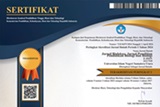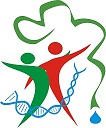PBL-based STEM: Its effect on the cognitive learning outcome of junior high school students
Abstract
Keywords
Full Text:
PDFReferences
Alkautsar, S., Nuryady, M. M., Husamah, H., Wahyono, P., & Miharja, F.J. (2023). STEM-PjBL Worksheet: Ways to Improve Students’ Collaboration, Creativity, and Computational Thinking. Jurnal Kependidikan: Jurnal Hasil Penelitian Dan Kajian Kepustakaan Di Bidang Pendidikan, Pengajaran Dan Pembelajaran, 9(2), 681–695. https://doi.org/10.33394/jk.v9i2.7587
Anggraini, W.N., Purwanto, A., & Nugroho, A.A. (2020). Peningkatan hasil belajar kognitif biologi melalui problem based learning pada siswa kelas X SMA Negeri 1 Bulu Sukoharjo. IJIS Edu : Indonesian Journal of Integrated Science Education, 2(1), 55. https://doi.org/10.29300/ijisedu.v2i1.2864
Astuti, S.P. (2015). Pengaruh kemampuan awal dan minat belajar terhadap prestasi belajar fisika. Formatif: Jurnal Ilmiah Pendidikan MIPA, 5(1), 68–75. https://doi.org/10.30998/formatif.v5i1.167
Davidi, E.I.N., Sennen, E., & Supardi, K. (2021). Integrasi pendekatan STEM (Science, Technology, Enggeenering and Mathematic) untuk peningkatan keterampilan berpikir kritis siswa sekolah dasar. Scholaria: Jurnal Pendidikan dan Kebudayaan, 11(1), 11–22. https://doi.org/10.24246/j.js.2021.v11.i1.p11-22
Habibah, F.N., Setiadi, D., Bahri, S., & Jamaluddin, J. (2022). Pengaruh model problem based learning berbasis blended learning terhadap keterampilan berpikir kritis peserta didik kelas XI di SMAN 2 Mataram. Jurnal Ilmiah Profesi Pendidikan, 7(2b), 686–692. https://doi.org/10.29303/jipp.v7i2b.603
Hotimah, H. (2020). Penerapan metode pembelajaran problem based learning dalam meningkatkan kemampuan bercerita pada siswa sekolah dasar. Jurnal Edukasi, 7(3), 5. https://doi.org/10.19184/jukasi.v7i3.21599
Husamah, H. (2014). Pembelajaran bauran (Blended learning): Terampil memadukan keunggulan pembelajaran face-face, e-learning offline-online dan mobile learning. Prestasi Pustakaraya.
Husamah, H. (2015a). Blended project based learning: Metacognitive awareness of biology education new students. Journal of Education and Learning, 9(4), 274–281. https://doi.org/10.11591/edulearn.v9.i4.2121
Husamah, H. (2015b). Thinking skills for environmental sustainability perspective of new students of biology education department through blended project based learning model. Jurnal Pendidikan IPA Indonesia, 4(2), 110–119. https://doi.org/10.15294/jpii.v4i2.3878
Husamah, H., Hudha, A.M., & Putri, Z.A. (2019). HOTS-authentic assessment model implementation of tissue structure materials in high school of Malang: A pre-validation final draft. Prisma Sains : Jurnal Pengkajian Ilmu Dan Pembelajaran Matematika Dan IPA IKIP Mataram, 7(2), 113–125. https://doi.org/10.33394/j-ps.v7i2.1997
Husamah, H., & Pantiwati, Y. (2014). Cooperative learning STAD-PJBL: Motivation, thinking skills, and learning outcomes of biology department students. International Journal of Education Learning and Development, 2(1), 77–94.
Jariyah, I.A., & Husamah, H. (2024). Profile analysis of critical thinking ability of science education study program students. Prisma Sains: Jurnal Pengkajian Ilmu Dan Pembelajaran Matematika Dan IPA IKIP Mataram, 12(1), 1–10.
Kadi, T., & Awwaliyah, R. (2017). Inovasi pendidikan : Upaya penyelesaian problematika pendidikan di Indonesia. Jurnal Islam Nusantara, 1(2), 122–132. https://doi.org/10.33852/jurnalin.v1i2.32
Khoiriyah, A.J., & Husamah, H. (2018). Problem-based learning: Creative thinking skills, problem-solving skills, and learning outcome of seventh grade students. JPBI (Jurnal Pendidikan Biologi Indonesia), 4(2), 151–160. https://doi.org/10.22219/jpbi.v4i2.5804
Kurniawati, K., & Hidayah, N. (2021). Pengaruh pembelajaran problem based learning berbasis blended leaarning terhadap kemampuan literasi sains. Bioedusiana: Jurnal Pendidikan Biologi, 6(2), 184–191. https://doi.org/10.37058/bioed.v6i2.3090
Lestari, D.D., Ansori, I., & Karyadi, B. (2017). Penerapan model PBM untuk meningkatkan kinerja dan kemampuan berpikir kritis siswa. Diklabio: Jurnal Pendidikan Dan Pembelajaran Biologi, 1(1), 45–53. https://doi.org/10.33369/diklabio.1.1.45-53
Melati, L.T. (2019). Pengaruh model problem based learning berbasis STEM terhadap penguasaan konsep dan kemampuan berpikir kritis siswa. Bioed: Jurnal Pendidikan Biologi, 59–65.
Naura, S., Nurdianti, D., & Maulana, S. (2022). Telaah pengintegrasian STEAM pada model problem based learning terhadap adversity quotient siswa dalam pembelajaran matematika. PRISMA, Prosiding Seminar …, 5, 598–605.
Ningsih, S.I.P. (2020). Penerapan model pembelajaran PBL terintegrasi STEM untuk meningkatkan aktivitas dan hasil belajar peserta didik di kelas XII IPA. Physics Education, 13(3), 443–450.
Nurhuda, H. (2022). Masalah-masalah pendidikan nasional; faktor- faktor dan solusi yang ditawarkan. Jurnal Pemikiran Dan Pendidikan Dasar Islam, 2(1), 127–137.
Nurwidodo, N., Romdaniyah, S.W., Sudarmanto, S., & Husamah, H. (2022). Pembinaan guru dalam melaksanakan pembelajaran STEM dengan kemampuan berfikir kreatif dan keterampilan kolaboratif pada siswa SMP. Sasambo: Jurnal Abdimas (Journal of Community Service), 4(1), 1–12. https://doi.org/10.36312/sasambo.v4i1.601
OECD. (2023). PISA 2022 Results (Volume I). OECD. https://doi.org/10.1787/53f23881-en
Phandini, I., Miharja, F., Husamah, H., Fauzi, A., & Nuryady, M. (2023). Modul Elektronik dengan Integrasi STEM-PBL: Efektif untuk Meningkatkan Kemampuan Berpikir Kritis Siswa. Jurnal Inovasi Pendidikan IPA, 9(2), 0. https://doi.org/10.21831/jipi.v9i2.60871
Puspitarini, D. (2022). Blended learning sebagai model pembelajaran abad 21. Ideguru: Jurnal Karya Ilmiah Guru, 7(1), 1–6. https://doi.org/10.51169/ideguru.v7i1.307
Rahardjanto, A., Husamah, H., & Fauzi, A. (2019). Hybrid-PjBL: Learning outcomes, creative thinking skills, and learning motivation of preservice teacher. International Journal of Instruction, 12(2), 179–192. https://doi.org/10.29333/iji.2019.12212a
Rahmadani, R. (2019). Metode penerapan model pembelajaran problem based learning (PBL). Lantanida Journal, 7(1). 75-86.
Rahman, A., Munandar, S.A., Fitriani, A., Karlina, Y., & Yumriani. (2022). Pengertian pendidikan, ilmu pendidikan dan unsur-unsur pendidikan. Al Urwatul Wutsqa: Kajian Pendidikan Islam, 2(1), 1–8.
Ramdiah, S., Abidinsyah, Royani, M., & Husamah. (2019). Understanding, planning, and implementation of HOTS by senior high school biology teachers in Banjarmasin-Indonesia. International Journal of Instruction, 12(1). https://doi.org/10.29333/iji.2019.12128a
Robiyanto, A. (2021). Pengaruh model brain based learning terhadap hasil belajar siswa. JEDMA Jurnal Edukasi Matematika, 1(2),1–7. https://doi.org/10.51836/jedma.v1i2.155
Sari, S.P. (2021). Pembentukan karakter tanggung jawab siswa pada pembelajaran daring melalui implementasi pendidikan karakter sioratna. Jurnal Kependidikan: Jurnal Hasil Penelitian Dan Kajian Kepustakaan Di Bidang Pendidikan, Pengajaran Dan Pembelajaran, 7(1), 110–121.
Sitorus, B. (2022). Penerapan model pembelajaran berbasis STEM dalam upaya meningkatkan hasil belajar kimia siswa kelas XII MIPA 7 SMA Negeri 7 Denpasar. Indonesian Journal of Educational Development, 3(1), 25–33. https://doi.org/10.5281/zenodo.6566334
Suarmawan, K.A., Meitriana, M.A., & Haris, I.A. (2019). Faktor-faktor eksternal yang mempengaruhi hasil belajar ilmu pengetahuan sosial siswa kelas VIII di SMP Negeri 3 Singaraja tahun ajaran 2018/2019. Jurnal Pendidikan Ekonomi, Volume 11,(2), 529–531.
Sumaya, A., Israwaty, I., & Ilmi, N. (2021). Penerapan Pendekatan STEM untuk Meningkatkan Hasil Belajar Siswa Sekolah Dasar Di Kabupaten Pinrang. Pinisi Journal of Education, 1(2), 217–223.
Suryadi. (2018). Pengaruh teknik asertif training terhadap sikap tanggung jawab pada siswa MTs Penyaring Kabupaten Sumbawa Besar. Jurnal Kepen, 4(1), 103–108.
Susetyarini, E., Nurohman, E., & Husamah, H. (2022). Analysis of students’ collaborative, communication, critical thinking, and creative abilities through problem-based learning. Jurnal Penelitian Dan Pengkajian Ilmu Pendidikan: E-Saintika, 6(1), 33–42. https://doi.org/10.36312/esaintika.v6i1.584
Syuhada, D., Hadi, K., & Amalia, Y. (2020). Peran guru dalam memotivasi belajar siswa pada pembelajaran biologi di kelas XI SMA Negeri 1 Meureubo Kabupaten Aceh Barat. Bionatural, 7(2), 16–25.
Widiara, I.K. (2018). Blended learning sebagai alternatif pembelajaran di era digital. Jurnal Purwadita, 2(2), 50–56.
Zulkarnain, I. (2019). Pengaruh kemampuan awal terhadap prestasi belajar matematika siswa. Jurnal Ilmu Pendidikan (JIP) STKIP Kusuma Negara, 11(2), 88–94. https://doi.org/10.37640/jip.v11i2.94
DOI: http://dx.doi.org/10.30821/biolokus.v6i2.2673
Refbacks
- There are currently no refbacks.
Copyright (c) 2024 Jurnal Biolokus: Jurnal Penelitian Pendidikan Biologi dan Biologi
indexed by :












